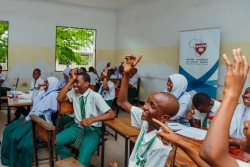
DEVELOPING AND PILOT-TESTING A WHOLE SCHOOL HEALTH AND NUTRITION INTERVENTION TO ADDRESS MALNUTRITION AND FOOD INSECURITY AMONG ADOLESCENTS IN TANZANIA. (COMPASS)
Low- and middle-income countries (LMICs) have increased rates of undernutrition and overweight and food insecurity in adolescents, resulting in delayed puberty, poor intellectual development, poor academic performance, and chronic diseases such as type 2 diabetes and hypertension. With the global expansion of school enrolment and attendance, schools offer a promising platform for addressing adolescents' nutritional challenges. Increasing use of mobile phones and social media by youth is driving the development of digital interventions for behavior change. Yet, educational strategies that engage adolescents, teachers, and parents digitally to address nutritional issues are few in LMICs.
The aim of this study is to develop, and pilot test a school-based digital nutrition intervention to address the double burden of malnutrition and food insecurity among adolescents (aged 13−15) in Tanzania. We hypothesize that the digital platform will be a feasible, acceptable, appropriate, and effective way of delivering nutrition education to adolescents, parents, and teachers within existing school health and nutrition environments and policies.
The project has successfully engaged with stakeholders in the school community with the aim of improving adolescents’ health and nutrition. The prototyped interventions focused on five priority areas for action: (i) promoting individual characteristics that influence behavior such as knowledge, attitude, beliefs, and skills among adolescents; (ii) developing interpersonal interactions, networks, and social support; (iii) engaging with families, food vendors, local communities; (iv) improving school governance and leadership, and (v) ensuring a health and nutrition-friendly school environment through curriculum, rules, regulations, and policies.
This project has employed a human cantered design by involving various groups of stakeholders such as parents, teachers, food vendors and most importantly, adolescents themselves in the design of project interventions. This will result in any developed intervention to have lasting sustainable impact in the community as it encompasses community views and contexts from the development stage. The project team is excited for the upcoming steps of the project which will include developing and testing the whole school digital intervention within the 2 sampled schools in Dar es Salaam.
VIEW MORE: https://youtu.be/rrbLQY75res?si=aJ2r7GNIu-tRpZTL